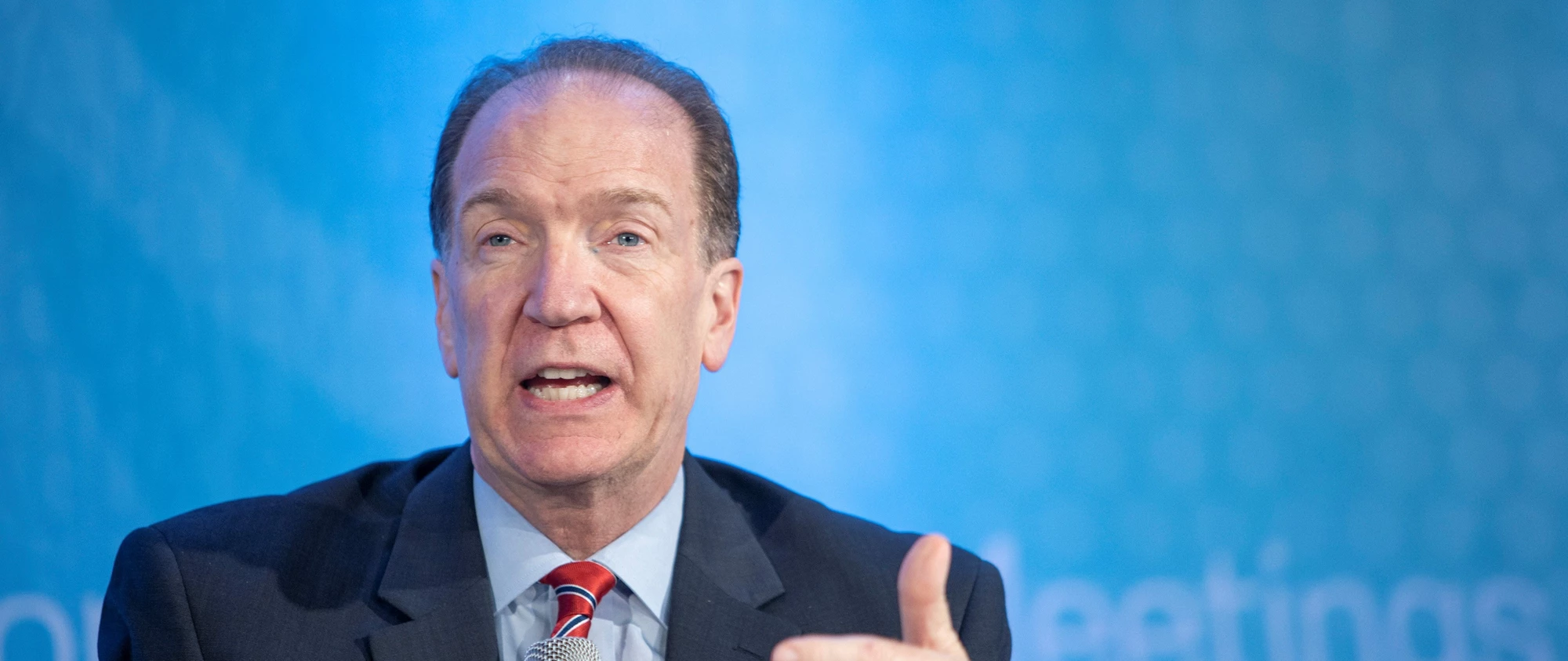 World Bank Group President David Malpass. Photo: © World Bank
World Bank Group President David Malpass. Photo: © World Bank
World Bank teams made significant progress this week on the response to the COVID-19 pandemic. Below is my summary of some of our activities:
- At the end of the week, World Bank teams are finalizing COVID-19-related projects in 60 countries for up to $2.8 billion under the $14 billion Fast Track Facility.
- Today (Friday), we sent 25 projects to the Board that will provide grants, credits and loans of $2 billion covering countries ranging from Afghanistan and Haiti to India and Ethiopia. Board approval is expected next week, with implementation beginning immediately thereafter. Projects in another 35 countries are under preparation to be approved in April and begin implementation.
- In parallel, we submitted a proposed financing framework to the Board that will expedite emergency efforts. Operations will help prevent, detect, and respond to the public health threat posed by COVID-19 and strengthen national systems for public health preparedness, especially important to prepare for follow-on waves of COVID-19.
- Each country level operation is tailored to the specific context and epidemic status of the country. The new framework will enable projects to be repeated across countries and over time in the same country; for example if other multilateral development banks (MDBs) wish to co-finance a follow-up tranche.
- In addition to those 60 new operations, we are working with countries to redirect existing projects to fight COVID-19, through restructuring, reallocation, triggering emergency components of existing projects (CERCs), and activation of Catastrophe Deferred Drawdown Options (CAT DDOs). As of this week, $1.9 billion ($0.8 billion approved and $1.1 billion under preparation) is being redeployed from ongoing World Bank projects in 35 countries across every region in which we work. Since last week, teams have been proactive in redirecting existing projects in 11 countries for up to $400 million. One example is in Bolivia, where we restructured an existing health project in order to purchase 300 ventilators.
- Beyond the health impact from the COVID-19 pandemic, we expect a major global recession. On Wednesday, I presented an additional phase of our COVID-19 response to our Board that should allow the World Bank Group, including IFC and MIGA, to deploy as much as $160 billion in commitments over the next 15 months. These operations will be tailored to the nature of the shock facing a country, and will include poverty alleviation, social protection and policy-based financing to support structural reforms – to shorten the time to recovery and build conditions for broad-based and sustainable growth.
- I participated in the G20 Virtual Leaders’ Summit on Thursday. I called on the G20 Leaders to allow the poorest countries to suspend all repayments of official bilateral credit. This would provide critical savings for the countries as they fight the COVID-19 pandemic.
- IMF Managing Director Kristalina Georgieva and I issued a joint statement supporting debt relief, and plan to seek endorsement for the proposal at the Development Committee virtual meeting of governors on April 17. For poor countries, debt sustainability will require a moratorium for official bilateral debt payments and may require reduction in the creditor’s net present value, and participation by commercial creditors.
- On Friday, we sent the Board an important debt-related step for IDA-19 called the Sustainable Development Finance Policy (SDFP). The objective of the SDFP is to incentivize IDA-eligible countries to make debt more transparent and sustainable and promote coordination among creditors. This may help lead to fair and equitable reductions in the net present value of debt owed by IDA countries.
- On Wednesday, I hosted another productive call with heads of the IMF and regional MDBs (ADB, AIIB, EBRD, EIB, IDB, IsDB). We discussed our institutions’ actions for COVID-19 response, the importance of co-financing the 60 World Bank operations underway, bulk procurement and logistics, and the importance of the private sector in our response. We received a very positive response to the joint WBG/IMF call for suspension of official bilateral debt payments by poor countries.
- Other important Bank operations are continuing. Here are a few highlights:
- Somalia: the World Bank and IMF determined that Somalia has taken the necessary steps to begin receiving debt relief under the enhanced Heavily Indebted Poor Countries (HIPC) initiative.
- Jordan: the Youth, Technology, and Jobs Project was approved to grow the country’s digital economy and absorb skilled labor to address economic growth and job creation.
- Bangladesh: the Dhaka Sanitation Improvement Project was approved for sanitation services, benefiting around 1.5 million people.
- Importantly, the United States authorized the IFC capital increase in the Coronavirus Aid, Relief, and Economic Security Act signed on Friday. The bill also included authorization of IDA-19. The IFC authorization will allow other countries to invest new capital in IFC. That’s especially timely given IFC’s large role in the COVID-19 response. IFC is helping existing clients in sectors directly affected by the COVID-19 pandemic to continue to pay their workers and suppliers, and is providing financial institutions liquidity and credit coverage to enable them to maintain working capital for SMEs, protecting jobs and the wider economy. The IFC is working on new investments in 300 companies and extending trade financing to companies that import and export goods.
- Lastly, and very good news, the 19th replenishment of IDA, the World Bank Group’s fund for the world’s poorest countries, has been officially adopted by governors. This is particularly helpful in the wake of COVID-19, since we will be rapidly deploying and frontloading IDA financing to countries as part of the response to the pandemic, consistent with the financial sustainability frameworks of our institution.
Next week will once again bring many urgent challenges. My huge congratulations and thanks to my colleagues around the world who are working with vigor and patience to address the crisis and had another spot-on week!
Originally published on LinkedIn.


Join the Conversation